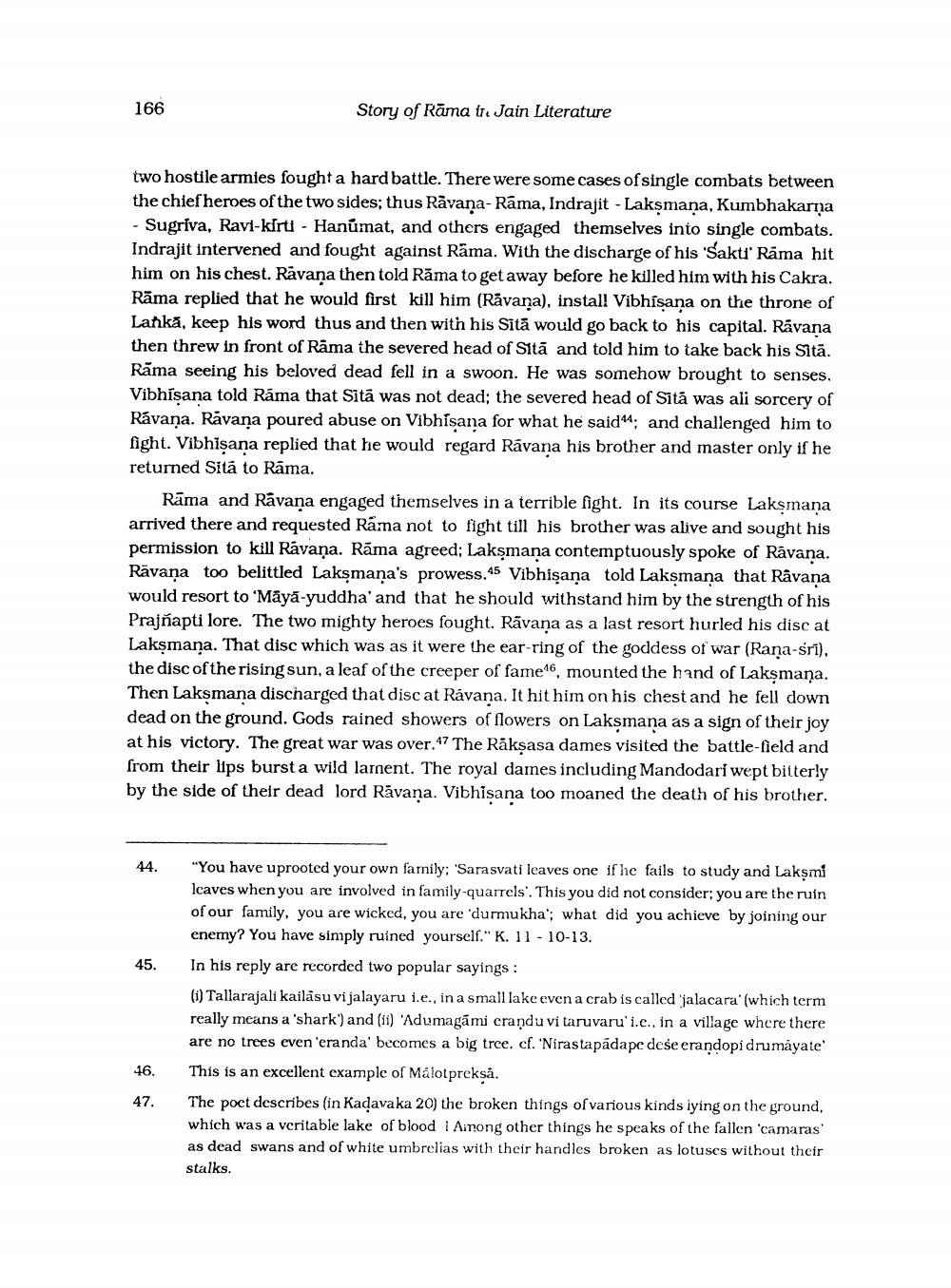________________
166
Story of Rāma in Jain Literature
two hostile armies fought a hard battle. There were some cases of single combats between the chief heroes of the two sides; thus Ravana-Rama, Indrajit - Laksmana, Kumbhakarņa - Sugriva, Ravi-kirti - Hanumat, and others engaged themselves into single combats. Indrajit intervened and fought against Rama. With the discharge of his 'Sakti' Rama hit him on his chest. Ravana then told Rāma to get away before he killed him with his Cakra. Rāma replied that he would first kill him (Rāvana), install Vibhísana on the throne of Lanká, keep his word thus and then with his Sita would go back to his capital. Ravana then threw in front of Rama the severed head of Sitā and told him to take back his Sitā. Rāma seeing his beloved dead fell in a swoon. He was somehow brought to senses, Vibhíşana told Ráma that Sita was not dead; the severed head of Sita was ali sorcery of Rávaņa. Rávana poured abuse on Vibhísana for what he said44; and challenged him to fight. Vibhisana replied that he would regard Ravana his brother and master only if he returned Sita to Rāma.
Rāma and Ravana engaged themselves in a terrible fight. In its course Laksmana arrived there and requested Rama not to fight till his brother was alive and sought his permission to kill Rávaņa. Rāma agreed; Laksmana contemptuously spoke of Rāvana. Rāvana too belittled Lakşmana's prowess.45 Vibhişana told Laksmana that Ravana would resort to 'Maya-yuddha' and that he should withstand him by the strength of his Prajňapti lore. The two mighty heroes fought. Rāvana as a last resort hurled his disc at Laksmana. That disc which was as it were the ear-ring of the goddess of war (Rana-sri). the disc ofthe rising sun, a leaf of the creeper of fame16, mounted the hand of Lakşmaņa. Then Laksmana discharged that disc at Rávana. It hit him on his chest and he fell down dead on the ground. Gods rained showers of flowers on Laksmana as a sign of their joy at his victory. The great war was over.47 The Raksasa dames visited the battle-field and from their lips burst a wild larnent. The royal dames including Mandodari wept bitterly by the side of their dead lord Rāvana. Vibhisana too moaned the death of his brother.
44.
You
45.
"You have uprooted your own family: 'Sarasvati leaves one if he fails to study and Lakşmi leaves when you are involved in family-quarrels. This you did not consider: you are the ruin of our family, you are wicked, you are 'durmukha'; what did you achieve by joining our enemy? You have simply ruined yourself." K. 11-10-13. In his reply are recorded two popular sayings : (i) Tallarajali kailāsu vijalayaru i.e., in a small lake even a crab is called 'jalacara' (which term really means a 'shark') and (ii) 'Adumagámi crandu vi taruvaru'i.c., in a village where there are no trees even 'eranda' becomes a big tree. cf. 'Nirastapādape dese erandopi drumayate This is an excellent example of Malotprekså. The poet describes (in Kadavaka 20) the broken things of various kinds iying on the ground, which was a veritable lake of blood i Ainong other things he speaks of the fallen 'camaras' as dead swans and of white umbrelias with their handles broken as lotuses without their stalks.




